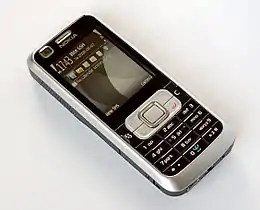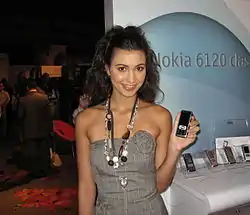Nokia 6120 classic
The Nokia 6120 classic is a mid-range smartphone from Nokia that was announced on 17 April 2007.[2] It runs on Symbian v9.2 with a S60 3rd Edition FP1 user interface.
 | |
| Manufacturer | Nokia |
|---|---|
| Compatible networks | Quad-band GSM, Dual-band UMTS/HSDPA in 850/2100 and 900/2100 configurations |
| Availability by region | 2007 |
| Predecessor | Nokia 6233 |
| Successor | Nokia 6220 Classic |
| Related | Nokia 6110 Navigator |
| Form factor | Candybar |
| Dimensions | 105 x 46 x 15 mm |
| Mass | 89g |
| Operating system | Symbian OS 9.2 + S60 platform 3rd Edition, Feature Pack 1 |
| CPU | ARM 11 @ 369 MHz |
| Memory | 64 MB (RAM), 128 MB NAND (35 MB free) |
| Removable storage | microSD (SDHC) (16 GB max)[1] |
| Battery | BL-5B Battery Li-ion 3.7V 890 mAh |
| Data inputs | Keypad |
| Display | TFT, 2 inches, 320 x 240 pixels, 16 million colors |
| Rear camera | 2-megapixel with LED flash plus Video recording and Panoramic options |
| Front camera | 240 x 320 pixels (QVGA resolution) |
| Connectivity | USB Mass Storage via mini USB, Bluetooth 2.0 with A2DP profile |
It is the first Nokia UMTS / HSDPA dual band phone which also features quad band GSM, supporting both 2G and 3G/UMTS networks. Despite its small and sleek size in a classic candybar form, it still retained standard S60 features and also has HSDPA (3.5G), the fourth from Nokia to do so after the N95, E90 and 6110 Navigator. It weighs only 89 grams.[3][4]
It should not be confused with Nokia 6120, a different mobile phone from 1997.
Interface changes
The 6120 classic user interface lacks the typical 3D animated menu items as well as some (thought to be Nokia standard) software, such as the Stopwatch. However, since it utilises the Symbian OS, third party programs can be installed to regain those applications.
Changelog
.jpg.webp)
V3.83
New features:
- -Applications
- -Browser stability improved
- -Bluetooth accessory compliancy improved
- -HSDPA throughput with internal Browser optimized
- -Playing stereo ringing tones using Bluetooth-500 headset improved
- -Improvements to Java MIDlet icon scaling
- -Improvements to Java icon outlook in Active idle
- -Saving of link is not automatically asked after streaming
- -Handling of DRM content improved
- -Some access point settings changed
- -Improvements to back-up restore reliability
- -Switch application certificate updated
- -Tutorial localization strings updated
- -Hungary language support added to Russian language package
- -General protocol improvements
- -Idle mode current consumption optimized
- -Removing of call forward icon after reboot improved
- -Operator list updated
V4.21
New features:
Diverses
- -Generic phonebook improvement
- -Localisation improvement
- -Browser functionality improvement
- -Generic HSDPA stack improvement
- -General Java improvement
- -Operator list updated
V5.11
New features:
Diverses
- -Support for a new memory component
- -City of Darwin added to the World Clock
- -DRM management improved
- -Operator name list updated
V6.01
.jpg.webp)
New features:
- -Tutorial content updated
- -Display text optimized for the call control application
- -Spanish translations updated
- -Operator name list updated
V6.51
New features:
- -Bluetooth modem connectivity fixed
- -Improve email push feature
- -Improve security certificate
V7.02
New Features:
- -Better sound quality
V7.10
New Features:
- -Deleted game "Highroller casino"
- -added "My Nokia" application
- -Unable to connect to Motorokr T505 car kit via bluetooth after upgrade
- -Delete some of default ringtone
- -operamini for 6120c
V7.20
X-plore bug Fixed (When opened an unknown file led to restarting phone)[5]
Nokia 6121 classic

Nokia 6121 classic is the first UMTS900 device on the market. It is available in five colours: Black, Blue, White, Gold and Pink. The 6120 classic and 6121 classic are identical, the only difference is that they have a different set of 3G frequencies.
Nokia 6122 classic
Nokia 6122 classic had a modified shell. The 6120 classic and 6122 classic are identical on the inside.
Nokia 6124 classic
The Nokia 6124 is a Vodafone variant of the Nokia 6120 classic. Shape design is even rounder than 6120, and different function key arrangement.
NM705i/706i
The FOMA NM705i is the NTT DoCoMo version of the 6120 classic released March 2008. The phone lacks the ability to install native applications, and also lacks HSDPA and an email client. NM705i has i-mode software (i-mode browser, i-mode mail, i-appli) instead of MIDP applications, MMS, and the Nokia web browser. Available colors are Black, White, and Orange (NM705i original).
Later, August of same year, introduced FOMA NM706i carries a same exterior design as the 6124 classic and NM705i specifications. Available Black color is same as NM705i, but Red and Silver color is newly available instead of Orange and White.
Features
The American 6120 classic has UMTS 850/2100 MHz with HSDPA while the 6121 classic has UMTS 900/2100 MHz with HSDPA. Both models support quad band GSM. On a network supporting HSDPA 3 Mbit/s download rate is possible on this phone. The NM705i has FOMA 800/850 MHz, 2 GHz connectivity.
All models feature a secondary front mounted camera for video phone calls. The resolution of the camera is only 320x240, since the video calls are only shown on other handsets screens. The front camera can also be used to take self-portraits. The regular camera is a 2-megapixel camera with 4x digital zoom, but no autofocus.
Nokia has begun to move away from the traditional proprietary Pop-Port. The phone features a standard Mini USB connector which does not charge the battery. When a USB cable is connected, the phone asks what type of connection it should make, with the choice of media player, PC-suite or Data transfer. The data transfer mode allows the phone to function as a mass storage device making a card reader (to access the phone's microSD card) unnecessary.
The base of the phone also features a 4-part 2.5 mm socket for the supplied headset. When the supplied 4-part 2.5 mm headset is plugged in, it can function as an antenna for the stereo FM radio that also has support for Visual Radio.
It is possible to connect a 3-part 2.5 mm to 3.5 mm adapter to use with standard headphones, however as normal headphones do not have a microphone, this feature may be best suited for media viewing/listening only. The audio player supports MP3, M4A, eAAC+ and WMA formats. iTunes protected audio is not compatible, however iTunes Plus music can be played on the phone.
The phone is capable of Video recording-QVGA with the resolution of 320x240 @15fps the front camera can also be used but only with a resolution of 176x144.
For video playback the phone has H.264/MPEG-4 AVC , H.263, RealVideo 7,8,9,10 support.
The phone has the Java ME environment: MIDP 2.0, CLDC 1.1 installed. The NM705i has Java turned off as Java applications are replaced by i-mode software components.
External links
- "Nokia UK – Find Out About the Nokia 6120 Classic Mobile Phone from Nokia. See Product Info and Technical Specifications". Archived from the original on 1 July 2008.
- "Review: Down-to-earth Nokia 6120 Classic Symbian Phone". Archived from the original on 14 November 2007.
References
- Officially supports microSD cards up to 2 GB, unofficially supports 2 GB microSDHC cards
- "The new Nokia 6120 classic combines faster download speeds with functionality". Archived from the original on 15 July 2014.
- http://www.allaboutsymbian.com/features/item/Nokia_6120_Classic_Production_Model_Unboxing_Preview.php
- http://www.knowyourmobile.com/nokia/6120/2516/nokia-6120-classic-reviews-round
- "Firmware versions of Nokia mobile phones - Nokia 6120c classic". Archived from the original on 18 September 2011.